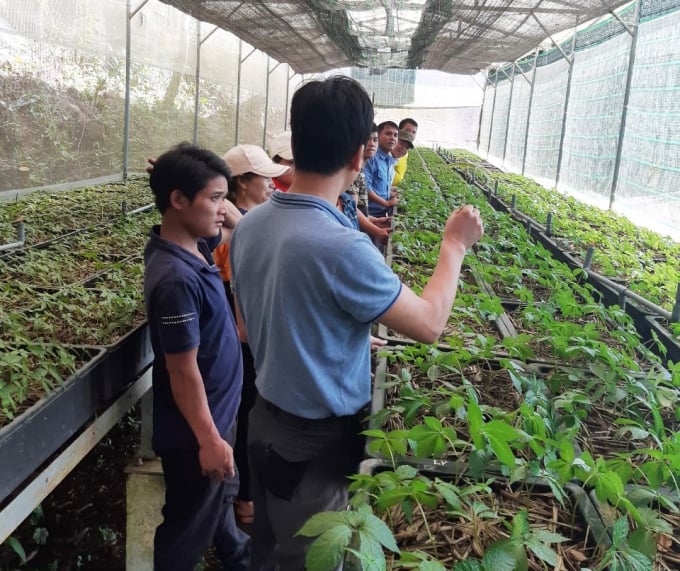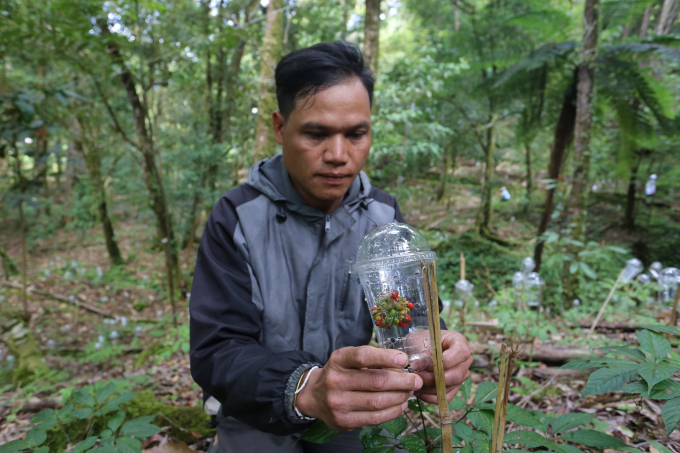June 18, 2025 | 17:44 GMT +7
June 18, 2025 | 17:44 GMT +7
Hotline: 0913.378.918
June 18, 2025 | 17:44 GMT +7
Hotline: 0913.378.918

Current measures for controlling pests and diseases on Ngoc Linh ginseng applied in the nursery still have very low efficiency. Photo: L.K.
Ngoc Linh ginseng is a special medicinal plant of the high mountain areas on the Ngoc Linh mountain range. It was found in 1973 in the Ngoc Linh mountainous area of Dak To District, Kon Tum Province, and Nam Tra My District, Quang Nam Province.
According to experimental research by scientists, Ngoc Linh ginseng not only has typical pharmacological effects of the genus Ginseng, but also of other significant pharmaceutical functions such as anti-stress, anti-depression, immune system stimulation, and anti-inflammatory toxins that damage cells…
At a national conference on the development of Vietnamese herbal medicines, the Prime Minister emphasized that Ngoc Linh ginseng must be considered as a precious national treasure and it is necessary to preserve, develop and strengthen research as well as apply it to treatment and health care activities.
Ngoc Linh Ginseng is characterized by a slow growth under the canopy of wet forests and rich plant composition. Currently, natural ginseng has been gradually exhausted. Therefore, to meet the market and business demands, farmers have started to grow it in concentrated planting areas, with strict intervention and control.
In fact, in recent years, a number of researches on breeding techniques and farming methods have achieved certain success and effectively applied to production. This has contributed to the effective and sustainable development of ginseng ensuring suitable ecological conditions for its growth.

Farmers are trained on pest control for Ngoc Linh ginseng. Photo: L.K.
Despite that, only some researches on pest control have been done. Current prevention measures have not yet brought about desired results. Some plant protection drugs have been tested by farmers in preventing pests and diseases for seedlings in nurseries, but they are almost ineffective or have very low effectiveness.
With the aim to select and develop some measures to control pests and diseases for Ngoc Linh ginseng in a biological, effective, and sustainable direction as well as improve its yield and quality, the Institute Plant Protection in cooperation with Ngoc Linh Ginseng Development Center and Quang Nam Medicinal Materials has carried out a research project on the application of biological measures to control pests and diseases for Ngoc Linh ginseng in Quang Nam. The project is directed by Dr. Le Xuan Vi with the implementation period lasting from February 2019 to April 2021.
Accordingly, the project has determined the composition, biological characteristics, arising evolution, and assessment of the main pests and diseases’ harmful effects on Ngoc Linh ginseng. It has collected and selected 1-2 beneficial microorganisms in the growing area which have the potentials for producing and developing preventive probiotics products.
At the end of the implementation period, the project had identified 9 major pests and diseases on Ngoc Linh ginseng that can cause damage at both seedling and non-production stages. Among them, aphids (Neomyzus sp.), seedling death (P. glomerata), anthracnose (Colletotrichum acutatum), and rust (Pucinia sp.) are found the most common and dangerous diseases.

The use of biological products that have been studied and experimented with pest and disease prevention on Ngoc Linh ginseng will help the plants grow and develop well, with higher efficiency and productivity. Photo: L.K.
Along with determining the phylogenetic characteristics of these pests and diseases, the research team collected beneficial microbial strains and conducted some biological pest control experiments. The results showed that Bacillus subtilis and the antagonistic fungus Trichoderma sp. collected from ginseng growing areas have potentials for research and development of disease preventive biological products.
In particular, the project has developed a process for collecting, separating and selecting beneficial microorganisms. It has also created 10 liters of inoculant from Bacillus subtilis to serve for research and pilot implementation. The research team also conducted pest control experiments with probiotics.
Laboratory studies have been modeled on a scale of 2,000 plants, applying key pest control techniques. The effectiveness of aphid control is from 61.08% to 78.99%; Tree height in the model has increased from 0.1 - 0.8cm; The average number of seeds increased by 25.25%. The rate of infected plants and the rust index were significantly reduced.
Mr. Truong Cong Quang, Deputy Director of the Center for Development of Ngoc Linh Ginseng and Quang Nam Medicinal Materials, said that currently, the biological products made from the project are under the monopoly of the Plant Protection Institute, so the Center only applied in small scale areas to compare with others having not applied it.
Translated by Linh Nguyen
![Turning wind and rain into action: [9] Digitizing hydrometeorological data in response to climate change](https://t.ex-cdn.com/nongnghiepmoitruong.vn/608w/files/news/2025/06/17/z6704423696987_15fd32ffc26d590d204d520c9dac6786-nongnghiep-165943.jpg)
(VAN) Farmers have begun accessing hydrometeorological applications to adjust their cropping schedules, aiming to ensure productivity and adapt to climate change.
![Turning wind and rain into action: [8] Real-time salinity detection and early warning technology](https://t.ex-cdn.com/nongnghiepmoitruong.vn/608w/files/news/2025/06/17/z6704423696987_15fd32ffc26d590d204d520c9dac6786-nongnghiep-151127.jpg)
(VAN) Thanks to the integration of modern hydrological-hydraulic models, remote sensing technologies, and artificial intelligence, the accuracy of hydrological forecasting has significantly improved.
![Turning wind and rain into action: [7] Early disaster warnings help marine farmers minimize losses](https://t.ex-cdn.com/nongnghiepmoitruong.vn/608w/files/news/2025/06/17/z6704423696987_15fd32ffc26d590d204d520c9dac6786-nongnghiep-142942.jpg)
(VAN) In recent years, thanks to early disaster warnings and forecasting, marine farmers in Khanh Hoa province have been able to reduce risks and losses, thereby improving production efficiency.
![Turning wind and rain into action: [6] ‘Four on-the-spot’ disaster management software](https://t.ex-cdn.com/nongnghiepmoitruong.vn/608w/files/news/2025/06/17/e5a48259d6a262fc3bb3-nongnghiep-183800.jpg)
(VAN) By simply activating the scenario on the disaster management software, the relevant authorities immediately know how many households need to be evacuated, where to evacuate them to, and by what means of transportation…
![Turning wind and rain into action: [5] Hue applies modern technology in disaster forecasting](https://t.ex-cdn.com/nongnghiepmoitruong.vn/608w/files/news/2025/06/17/z6704423696987_15fd32ffc26d590d204d520c9dac6786-nongnghiep-093938.jpg)
(VAN) In Hue city, modern technology has recently been applied in meteorological and hydrological forecasting and warning, helping to reduce the damage caused by natural disasters.

(VAN) A cutting-edge farming technique being implemented on an experimental ranch in Arizona's Sonoran Desert has already saved a billion gallons of water over five years, according to Civil Eats.

(VAN) Poultry and pig production and the environment can be boosted through enhanced water technology, according to new research.